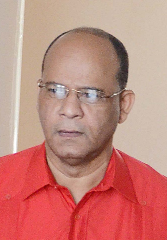President Donald Ramotar is not bound by the passage of the motion of no confidence against Minister of Home Affairs Clement Rohee, a senior legal practitioner has advised Speaker of the National Assembly Raphael Trotman.
Trotman has also been advised that Rohee can continue to perform his functions as the motion does not bind either the minister or the Prime Minister to obey it. “However, in other jurisdictions he would have been forced by convention to resign as a Minister,” the senior counsel wrote in his advice to Trotman, which was seen by Stabroek News.
Trotman sought advice on the enforceability of the opposition-led motion, which was passed by the National Assembly in July. At the last sitting of the National Assembly, on October 22, 2012, during the introduction of a new bill by Rohee, Trotman said that he had sought legal advice to understand how it is he will be proceeding with the motion against the minister. “I have gone through the Standing Orders and I am not certain of what powers I have to prevent anyone from introducing any Bill,” Trotman had said just as the embattled Minister was going to lay a new piece of legislation before the House. Members of the opposition made noise to drown the minister’s first reading of the bill.
The government has filed a constitutional motion challenging the vote.

In a letter to Trotman, dated November 2, 2012 and relating to the subject of ‘Enforceability of motion of no-confidence,’ the Senior Counsel said he did not think that the President must comply with the motion. “I am of the opinion that the Minister can continue to perform his functions. The legislature has passed a motion of no-confidence; it has not enacted a law. The motion does not bind the Minister or the Prime Minister to obey it,” he said.
However, the Senior Counsel was critical of government’s move to the court on a Constitutional Motion, which he said does not restrict further action or comment in the National Assembly. “The [Constitutional Motion] is a sham and an abuse of process intended to gag the National Assembly from discussing the consequences of the motion,” the lawyer wrote.
He pointed to the judgement of Lord Denning in Wallersteiner v. Moir No. 2 (1994), in which Lord Denning MR and Justice Scarman held that it the supposition that once a writ is issued, it puts to stop discussion is a complete misconception. “If it is a matter of public interest, it can be discussed at large without fear of thereby being in contempt of court. Criticisms can continue to be made and can be repeated. Fair comment does not prejudice a fair trial,” the ruling said.
In addition, the letter cited a reference in the Erskine May’s Parliamentary Practice on the sub judice rule, which speaks to a qualification by the right of the House to legislate on any matter.
The opposition on the morning of July 31 used its majority to adopt the no-confidence motion, calling for the removal of the Minister. About 20 speakers on both sides of the House debated the motion in a marathon session that went into the wee hours.
During the debate, Rohee said that a no-confidence motion cannot and will not arrive at the truth of the circumstances surrounding the shooting deaths of three protestors at Linden. “To place blame at the feet of the staff of the Ministry of Home Affairs flies in the face of the presumption of innocence,” he said.
Writing in a letter to the editor, APNU MP Carl Greenidge has said, “The House accepted the position of the Opposition speakers and passed a vote of no-confidence in Mr. Rohee.
The decent thing to do in such circumstances would have been to follow the convention and resign. He now hides behind the shirt tail of the President. Unfortunately for him, the President has no veto as in the case of a Bill. Refusal to act on instructions carried in a motion constitutes contempt.
As a consequence, the APNU has already decided that until Mr. Rohee resigns they will entertain no bill laid by him, extend no courtesies to him as a speaker and approve no monies for his ministries.”








